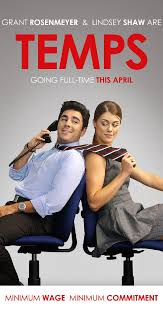Eye For Film >> Movies >> Temps (2016) Film Review
Temps
Reviewed by: Jennie Kermode

Meandering comedies about California slackers are a staple of American indie filmmaking. Ryan Sage's second feature directly parallels the culture of drifting between jobs with that of drifting between relationships, following an office romance whose participants quickly start pulling in different directions. Both Jefferson (Grant Rosenmeyer) and Stephanie (Lindsey Shaw) like heat-of-the-moment, honest and passionate sex, but how that's framed turns out to be just as important, and by staying with the male protagonist, the film complicates what the romcom formula generally has to say about it.
Superficially - and this is a story very much concerned with the superficial - this is a light, breezy affair with sexually assertive characters who know what they want and have a great time together. The tone changes in the second half when things don't work out as intended, but the dialogue stays snappy and there's still a good deal of humour. The style is theatrical, only intermittently undercut with realism, and moments of absurdity don't always hit the spot, but if all you want is a whimsical story about relationships then you'll probably enjoy this without looking any deeper.

Stephanie wants a relationship. This expands a little on the usual genre cliché about women. She sees life as something with inherent direction and having a relationship that develops in a socially approved way is as important to her as getting a permanent job and building a career. If the film has one major weakness, it's that it tends to take for granted that this is the right way to do things, when a more nuanced stance might have produced something more interesting. Jefferson's dad lives on a friend's boat and is taking life easy. Is he living the dream or has he given up? This is a highly subjective question, but in one cruel scene, Jefferson tries to turn it into something else. He's framing himself in contrast to his dad, telling himself that he's found a sensible middle ground, and thereby overlooking the fact that he's dependent on sleeping on a friend's couch - but it's difficult to tell if the changes he undergoes will get him any closer to fulfillment of if he's still merely reacting and rebelling, just in a different direction.
Where the film is stronger is in its dissection of the assumptions on which the romcom is built - boy meets girl, boy loses girl, boy changes his life, boy wins girl back - and its refusal to indulge Jefferson as the most important person in the narrative. Coming to terms with other people's agency is perhaps the only real bit of character development he undergoes, but it's effectively delivered. There's an embarrassing interlude with a magical goth chick who helps him find himself (and, like most goth chicks in films and virtually none in real life, is desperate for sexual attention and approval from a non-goth guy), but this is balanced somewhat by the more complex relationship between Jefferson and his best friend (played by Reid Ewing), the other area in which he's forced to accept change.
Ultimately, the moral of the film seems to be that what really matters in a relationship is having the same opinion about Godzilla films, even if that opinion is palpably wrong. As romantic comedy messages go, this is probably one of the smarter ones.
Reviewed on: 06 Apr 2016















